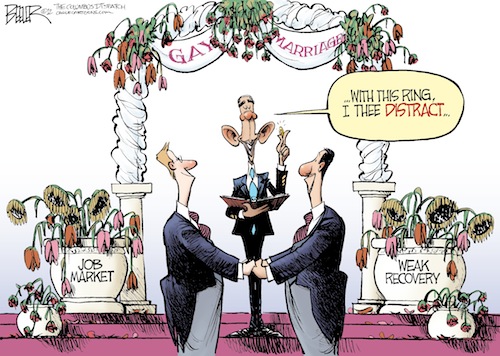
A trenchant political cartoon points out that Obama made states ban gay marriage in order to distract us from the economy.
Today is the day, or one of several days this week: the Supreme Court has begun hearing arguments on Proposition 8, California’s ban on same-sex marriage. Probably this it the first you have heard about this issue. To recap: the California Supreme Court affirmed the right of gay couples to marry in 2008. In November of that year, voters approved a ballot measure amending the California constitution to limit marriages to opposite-sex couples. In 2009, Theodore Olson and David Boies filed Hollingsworth v. Perry, No. 12-144, in which they argued that Prop 8 violated the federal constitution by allowing California voters to override their state’s supreme court. Judge Vaughn Walker of San Francisco’s Federal District Court agreed, but his decision was stayed pending Supreme Court review. That started this morning.
I’m going to assume that if you’re reading this, you think the government should let gay people get married. I sure do, and we are recently in the majority. Gay marriage has been a wedge issue for almost ten years. Back when Karl Rove used it as a genius means of getting church people to turn out for the 2004 election, a sturdy majority opposed letting same-sex couples get married. Since then, the numbers have flipped. It’s almost as if broad social prejudices were susceptible to the national discourse.
It’s not like new information has emerged revealing that gay marriage is okay. Generally speaking, the anti-gay marriage position relies on two arguments: gay marriage will somehow undermine heterosexual marriage, and being gay is wrong. The first argument never made sense; even to the people who came up with it, “defense of marriage” functioned as a euphemism for argument number two. And argument #2 is not so much an argument as a premise. It is a declaration of values, and values are by definition the starting point of argument. You cannot argue values because, as premises, they are not justified. The claim “being gay is wrong” must appeal to the Bible, itself a non-argumentative declaration of values, or to the ick factor.
Neither withstands much examination. For the last ten years, Americans have examined the fudge out of gay marriage, and our opinions have shifted accordingly. Not by coincidence, the timeline that has Americans starting out opposed to gay marriage, thinking about it, and then gradually changing our minds is juxtaposed with another timeline—one that has gay marriage starting out with approval from the courts, then disapproval in ballot initiatives and state houses and other instruments of voter democracy, followed by a return to the courts. Voters once took to the ballot box to undo the rights that the courts offered gay couples; now we look to the courts to undo the restrictions we voted back in.
It’s kind of a frustrating cycle. It’s also one the founders identified in the late 18th century, and the one they structured the federal government to ameliorate. The American public’s peripatetic attitude toward gay marriage is an example of the problem Alexander Hamilton pleasantly called national character. A nation must have good character in order to succeed, but even in a large country, character can be found only in a handful of citizens. As a branch of government only indirectly subject to the will of the people, whose functionaries are hand-picked by elected representatives, the courts are national character distilled. They decide on what’s right, which is implicitly contrasted to what the people want. If the people were right all the time, we wouldn’t need courts.
This broad principle is especially true in the area of minority rights. Time and again, the courts have made civil rights decisions that contradicted and then, in retrospect, expressed the will of the American people. Brown v. Board of Education overturned decades of voter-endorsed segregation laws in the southern states and prompted popular outcry; a mere 50 years later, you would be hard-pressed to find any serious person who supports racially segregated schools. So it may be with gay marriage. If the for/against ratio has changed this much in ten years, how will it look in fifty? What will our grandchildren think about Proposition 8?
I personally hope that SCOTUS overturns Prop 8, because I want gay people to get married. I also hope they overturn it because, my general commitment to radical democracy aside, I don’t think The People should get to vote down the rights of Some People. It is one of few areas in which Alexander Hamilton and I agree. The last decade’s mania for laws against specific people getting married has reflected poorly on our national character. It has also shown us that character can improve. Perhaps, as we have in the past, all we need is a little stern correction from on high.




This tension between The People and The Some is never more clear than the attempts to banish Westboro Baptist with Whitehouse petitions, civil actions, and the most honed form of political participation, the identity declaring facebook post. What a lot of people don’t know, is that the 112th Congress actually passed a law (*rim shot*) that almost solely targets Westboro.
http://www.whitehouse.gov/blog/2012/08/06/president-obama-signs-honoring-americas-veterans-and-caring-camp-lejeune-families-ac
“you would be hard-pressed to find any serious person who supports racially segregated schools.”
I think you’re being sadly optimistic, especially considering the amount of de facto segregation in modern schools.